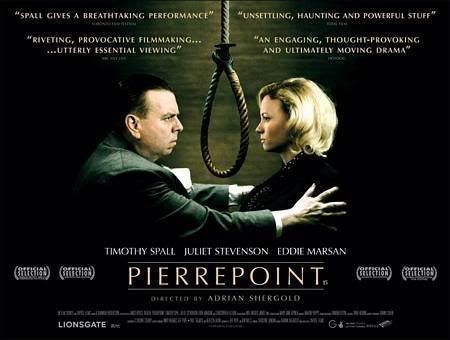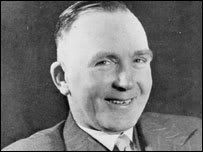Pierrepoint.

I just watched 'Pierrepoint: The Last Executioner', a film about Albert Pierrepoint. To start with, he wasnt actually the last, having resigned from the List of HM Executioners a good few years before the death penalty was abolished in Great Britain. He was however the most famous.
Fame wasnt a good thing for Executioners. Their job was based entirely upon discretion. Reading about Pierrepoint, then watching the film, i was struck by his character. His job was to as quickly and painlessly do away with the lives of those deemed deserved of the death penalty by the British government. His record for meeting, escorting and hanging a condemned prisoner was 7 seconds.
He is portrayed as being a consummate professional, showing no emotion yet, utmost respect for his victims, ensuring that every drop distance was suitable for each individual, that they died as close to within an instant as possible, then taking the utmost of due care in disposing of the corpse afterwards, stating that the deceased was now an innocent and deserved the very most in terms of respect and dignity.
One of the most important aspects of being an Executioner was this discretion. The job was performed as it was requested by the authorities. The executioner was paid and commissioned based upon his competence and whether or not he remained discrete, only receiving full payment once a few weeks had past after each job.
Pierrepoint's discretion ended after he was called by the British War Cabinet to execute the Nazi operators of the Belsen concentration camp. He executed 43 Nazi officers in one week, a number that couldn't go unnoticed by the press.
He became a hero upon his return to England, and an aspect that all Executioners strive to avoid was thrown upon him. His job was always to deliver death in a discrete and humane fashion, without any animosity being thrown into the mix. While fame never gave him any animosity, it allowed him to become a channel for the animosity of the British public after the war.
In due course tho, his career did catch up to him personally. While he always managed to 'leave himself' outside whenever he walked into the gallows chamber, in November 1950 he was forced to hang a friend, James Corbitt, who'd been condemned for killing a girlfriend. The angst of killing someone he cared for, combined with the fickle manner in which the authorities decided on whether or not to pay him for his services and the fact that he'd often travel great distances only to find that the intended had been given a reprieve from death, led him to resign in 1956, not surprisingly the first year before the abolition of the death penalty in which not a single execution took place.
During his years as an executioner he'd run a pub in Manchester and later near Preston. His wife chose never to talk to him about his sideline career, a pact he upheld until his execution of Corbitt. Upon breaking down with grief at what he had done, his wife was unable to cope and the matter was dismissed until he resigned.
In later years, with the Death Penalty abolished he refuted his pro death stance, noting that of the possible 600 condemned he hanged, most committed crimes of passion, the kind of crimes to which capital punishment offered no deterrent and that hanging those convicted amounts to little more than revenge.
Based on the film and all ive read, i have to admire the man. Given the context of the time, when capital punishment was common in Great Britain, he was the best man for the job. Given many countries to this day still employ firing squads and electric chairs, Pierrepoint set a very humane example as much as 70 years ago. To that end, if history has to bear the burden of something like capital punishment, at least Albert Pierrepoint did his best to make it less barbaric.
